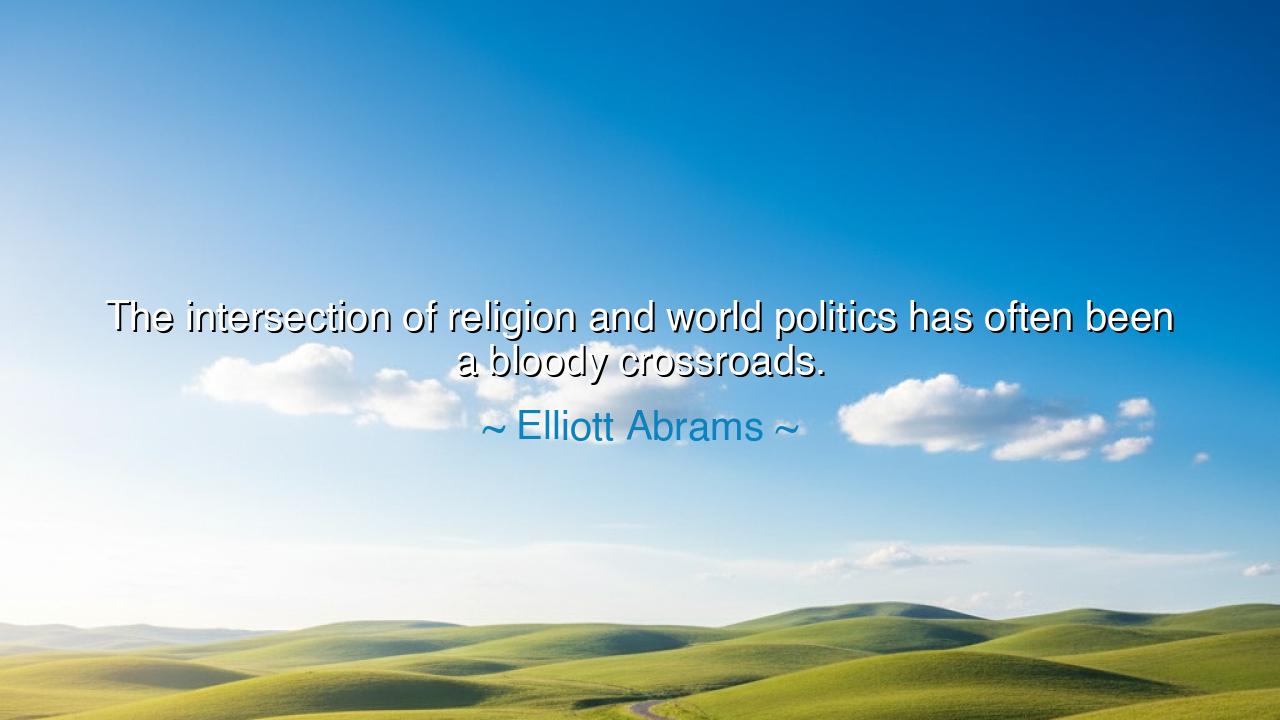
The intersection of religion and world politics has often been a






Hear now, O seekers of truth, the sobering words of Elliott Abrams, who speaks of a crossroads where the sacred and the worldly meet—a place often drenched in the blood of the innocent. The intersection of religion and world politics has been a path fraught with violence, where the noble teachings of faith have been wielded like swords, and the cries of the oppressed have been drowned in the clash of ideologies. This crossroads, ancient and yet ever present, is the scene where belief and power collide, often in a tempest of conflict.
From the dawn of human history, when the first kings sought to rule both the land and the spirit, the intersection of faith and politics has been a battleground. It is said that even the mightiest empires have been forged in the name of gods, but also shattered by the very beliefs they sought to control. The Crusades, those bloody wars of the Middle Ages, stand as a testament to this tragic confluence. Here, the cross clashed with the crescent, as both sides fought not just for dominion over the earth, but for the right to define the will of the divine. Thousands perished under the banner of faith, yet the promised salvation seemed ever distant.
In more recent times, the world has witnessed the same tragic pattern unfold. The Thirty Years' War, a conflict that ravaged Europe, was born of a bitter struggle between Catholicism and Protestantism. Faith was not merely a guiding light for the soul, but a weapon to be wielded by kings and emperors seeking to solidify their reigns. The fires of religious intolerance scorched the land, leaving in their wake the shattered lives of countless innocents. From this, we learn that when the divine is used to justify human ambition, the result is often destruction.
Consider, too, the horrors of the Inquisition, where the zeal for spiritual purity led to the torturous deaths of those deemed heretics. Here, the sacred flames of faith became entwined with the oppressive chains of political authority. The state and the church walked hand in hand, each justifying its cruel acts with a holy righteousness, as the blood of those who dared to question stained the earth. This dark history serves as a warning: that the intertwining of religion and politics often sows the seeds of suffering.
The words of Abrams serve as a cautionary tale, for even in the modern age, the same forces continue to shape the fate of nations. The Middle East, a land once hailed as the cradle of civilization, has become a proving ground for the intersection of religion and world politics. The rise of extremist ideologies—whether in the name of Islam, Christianity, or any other creed—has left scars on the landscape. The conflicts in Iraq, Syria, and Afghanistan have shown us the tragic toll of such struggles, where men and women are consumed not only by the fires of war but by the belief that they are fighting for divine will.
Thus, from the annals of history, the message is clear: the intersection of religion and world politics has too often been a place of destruction. Faith—that most sacred of human pursuits—should never be co-opted for worldly gain. Political leaders, in their hunger for power, must not turn the sacred into a tool for domination. And the people, who are caught in the wake of this endless strife, must seek to hold both their faith and their humanity above the fray. For it is through tolerance, understanding, and a deep respect for the sacredness of all beliefs that true peace can be achieved.
In your own lives, O seekers, remember the lessons of history. Let your beliefs guide you with humility and love, not with the sword of violence or the shield of power. And if you find yourself at the crossroads, where religion and politics threaten to tear you asunder, choose the path of peace. For though the history of humankind is often written in blood, it is in the pursuit of understanding and compassion that we may yet find the true meaning of our faiths, our politics, and our shared humanity.






AAdministratorAdministrator
Welcome, honored guests. Please leave a comment, we will respond soon